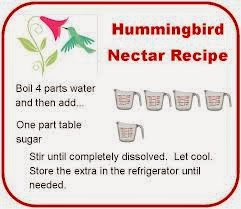ATTRACTING HUMMINGBIRDS
Hummingbirds have amazed
humans for thousands of years, darting though the air so fast it's hard to spot
them before they disappear. Now with hummingbird feeders it is easier than ever
to attract these delightful birds into our own gardens.
Following the flowers as
they bloom though the seasons, hummingbirds journey from Central America as far
north as Alaska and Canada every year. Acrobats of the air, they are able to
hover and stop in midair as they scout out the environment. Feeding five to
eight times an hour, it isn't long before they are off in search of fresh
flowers and their next meal. Hummingbirds have
the greatest energy output, gram for gram, of any known warm-blooded animal.
The recipe for the syrup
is simple. Bring one cup sugar and four cups spring water to a boil for one
minute. Let it cool to room temp before filling feeders and store extra nectar
in the refrigerator. Keep your feeders
clean and the sugar water fresh, replacing it every three or four days.
Hummingbirds rely
on established food supplies, so once you have attracted them they will become
a welcomed repeat visitor.
One of the great benefits
of a feeding station is that hummingbirds often take a short rest, allowing
time to observe them up close. Keep your binoculars close by and you might even
see it's tongue, twice as long as its beak dip into the feeder to lap up nectar.
In addition to a feeder
you can help attract hummingbirds by planting flowers, especially red as well
as tubular shaped such as salvias which these little critters love to visit. Besides nectar, hummingbirds consume protein in the form
of insects which they find inside flowers, on plants and in trees, in spider
webs and in midair as they travel through your yard. Consider that when using
pesticides in your yard and gardens. Hummingbirds also drink plenty of water.
Due to our
depleting forest and wild spaces, hummingbirds have less natural places to live
and feed. Your hummingbird feeder will
not only bring you years of enjoyment, but you will be helping these beautiful
creatures survive for future generations
to enjoy.
Happy Gardening,
James






No comments:
Post a Comment